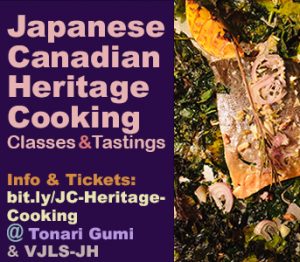Against the Current: a collaborative cross-cultural performance

sixty boats to feed one cannery
Japanese bosses recruit our young men
into cannery gangs
affordable housing exchanged for loyalty
and our labour on the line
cleaning fish, women filling
can after endless can
with salmon, filling
hour after endless hour
babies strapped to backs
the stink of fish and sea
trapped in hair and clothing
the taste of racism
bitter on the tongue
but the dream endures:
a new life
in this new land
from Against the Current
In 1888, Gihei Kuno, a master carpenter and shrine builder from Mio-mura, Wakayama-ken, left Yokohama, aboard the SS Abyssinia, bound for Steveston, Canada – a two-week voyage. Once in Steveston, he wrote back to his kunimono (people of his prefecture), “The fish are so plentiful, they virtually leap into boats. Come and join me.” Slowly at first, and then in a flood, others joined him in Canada. In time, most of Mio’s labour force emigrated to Steveston, sending cash home to their once-poor village, which became known as “America-mura.” Kuno came to be known as “Kanada Kaitaku no Chichi,” the Father of Japanese settlement in Canada. Prior to World War Two, Steveston boasted the second largest population of Japanese Canadians after Powell Street.
Just as the salmon fishery is inextricably linked to the history of the Japanese in Canada, so too is this iconic fish woven into the very fabric of this province, stretching back through time to the first peoples.
On Friday, November 6, a unique, collaborative performance, Against the Current, takes the theme of salmon and uses it as a jumping-off point to explore ideas of migration, perseverance, community and identity.
Presented by the Downtown Eastside Heart of the City Festival in partnership with the Vancouver Taiko Society, Against the Current brings together five local taiko groups, Japanese Canadian and First Nations singers and storytellers, and Downtown Eastside community members in a large-scale, cross-cultural performance at the Japanese Hall on Alexander Street.
Origins
The concept for Against the Current was birthed several years ago out of discussions between members of the Vancouver Taiko Society, as we began looking at what binds us together as taiko players, as community members, as British Columbians. We share an art form and common roots – most of us can trace our origins directly back to Katari Taiko, Canada’s first taiko group, but over the years we have diverged, following our own paths, or streams.
I think it was Diane Kadota, Katari Taiko’s manager, who suggested that we use salmon as a unifying theme. From that germ of an idea, the piece grew organically over the next few years, evolving slowly as we let it find its own course.
The project began with a simple concept. Each group was given the task of creating a piece built around the idea of fish or fishing. From there, we began to gather the threads that would enable us to weave the pieces together into a coherent whole.
It was local author Hiromi Goto, who I was working with on the text for Sansho Daiko’s piece, who suggested that we incorporate First Nations performers into the show. From there the pieces began to fall into place, and the creative process began to pick up steam.
Although Against the Current was set to premiere at this summer’s Powell Street Festival, we wanted to bring the piece into an indoor setting, with greater control over light and sound. We approached Terry Hunter and Savannah Walling of Vancouver Moving Theatre with the idea of presenting the show at the Downtown Eastside Heart of the City Festival and they whole-heartedly embraced the idea. The theme of this year’s Festival is “Nourished by Community,” making the inclusion of Against the Current all the more fitting.
Collaborators
Terry and Savannah introduced us to Rosemary Georgeson. A Sahtu Dene/Coast Salish artist who comes from a long line of fishermen, Rose tells a wonderful story of sharing a meal with a group of Japanese Canadian fishermen while moored with her father on Galiano Island, a story that was quickly woven into the show.
Another suggested collaborator was Coast Salish composer Russell Wallace, who, with his singing group Tzo’kam, had worked with Sawagi Taiko before. The group was a natural fit, in fact they begin and end the show with Zumac, a song and accompanying dance about the arrival of the spring (or chinook) salmon.
For the Heart of the City Festival iteration of the show, Grace Eiko Thomson was invited to share the spoken word duties with Rosemary Georgeson. A longtime community activist, curator and teacher, Grace in fact traces her roots back to Mio, the home of Gihei Kuno.
The taiko pieces were first workshopped at Katari Taiko’s 35th Anniversary concert at the Vancouver Playhouse last year and the piece itself premiered at this year’s Powell Street Festival. For the upcoming production we have fleshed it out with expanded text, new staging and the inclusion of Vancouver Okinawa Taiko, who bring their unique taiko tradition to the show.
When we began looking for a venue, the Vancouver Japanese Language School was at the top of our list, given its important place in the history of the community. It was the only building that was returned to the community following the lifting of restrictions against Japanese Canadians four years after the end of World War Two.
In recognition of the challenges presented by working in a large hall, we brought in theatre director James Fagan Tait as a consultant, helping us with staging and adapting the piece for this unique setting.
In parallel with the other aspects of Against the Current, Kazuho Yamamoto and Kathy Shimizu spearheaded the creation of large papier mâché community salmon, working with community members at the Carnegie Centre, Oppenheimer Park and the Vancouver Japanese Language School to create beautifully-painted creations that are carried by Downtown Eastside community members in the processions that begin and end the show.
Narrative Thread
In working with Savannah on the spoken word sections that would provide the narrative links between the various musical pieces, it became clear to me that there were two parallel threads running through the show: one, the idea of salmon as a sustaining resource that provided food and income, and in the case of the Japanese Canadians, a catalyst for mass immigration; and two, the life-cycle of the salmon as an over-arching metaphor for struggling against overwhelming odds to survive and to endure. Both the First Nations and Japanese Canadian communities have been nourished by the salmon, and both communities have had to struggle against the current for generations – in fact you could extend the metaphor to include the Downtown Eastside community as well.
It has been a privilege to work with Rosemary, Russell, Grace and Savannah on this production and I hope that it opens the door for further collaborations that can serve to bridge cultures and experiences in deep and meaningful ways.
Friday November 6, 8pm
Against the Current: a collaborative cross-cultural performance
Featuring Chibi Taiko, Katari Taiko, Sansho Daiko, Sawagi Taiko and Vancouver Okinawan Taiko, with Grace Eiko Thomson, storyteller Rosemary Georgeson (Sahtu Dene/Coast Salish), Salish singing ensemble Tzo’kam led by musician and composer Russell Wallace, narrative contributions by John Endo Greenway, Hiromi Goto and Savannah Walling, and over 25 Downtown Eastside community participants with community-made papier-mache salmon.
Vancouver Japanese Language School & Japanese Hall
487 Alexander Street
Tickets: $15 regular, $10 concession at the door.









